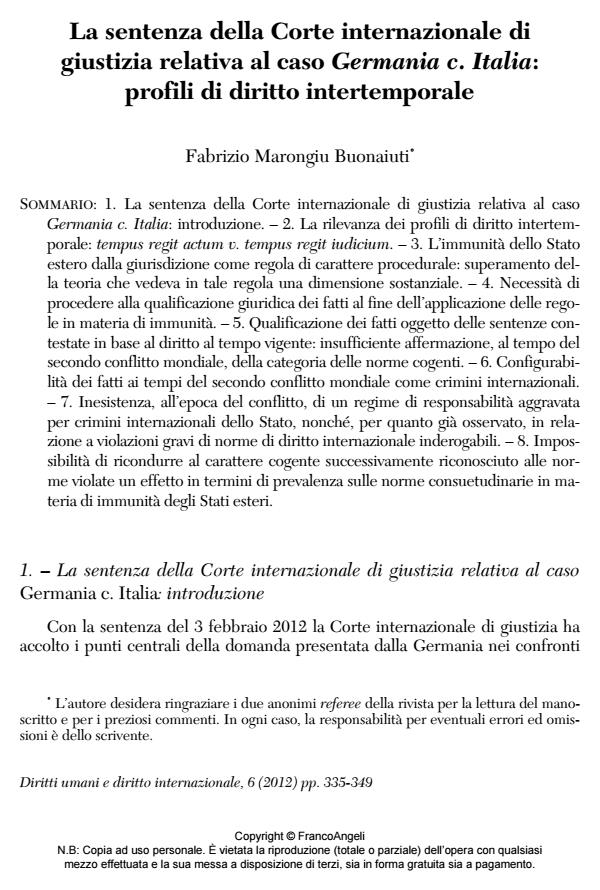La sentenza della Corte internazionale di giustizia relativa al caso Germania c. Italia: profili di diritto intertemporale
Titolo Rivista DIRITTI UMANI E DIRITTO INTERNAZIONALE
Autori/Curatori Fabrizio Marongiu Buonaiuti
Anno di pubblicazione 2012 Fascicolo 2012/2 Lingua Italiano
Numero pagine 15 P. 335-349 Dimensione file 186 KB
DOI 10.3280/DUDI2012-002006
Il DOI è il codice a barre della proprietà intellettuale: per saperne di più
clicca qui
Qui sotto puoi vedere in anteprima la prima pagina di questo articolo.
Se questo articolo ti interessa, lo puoi acquistare (e scaricare in formato pdf) seguendo le facili indicazioni per acquistare il download credit. Acquista Download Credits per scaricare questo Articolo in formato PDF

FrancoAngeli è membro della Publishers International Linking Association, Inc (PILA)associazione indipendente e non profit per facilitare (attraverso i servizi tecnologici implementati da CrossRef.org) l’accesso degli studiosi ai contenuti digitali nelle pubblicazioni professionali e scientifiche
The author comments on the judgment delivered by the ICJ on 3rd February 2012 in the case of Germany v. Italy, concerning jurisdictional immunity of the State against actions for compensation in respect of crimes committed during World War II. The article focuses on the intertemporal law aspects of the case, commenting that the ICJ, while correctly identifying State immunity rules as having a procedural nature, failed in clarifying that whenever their application requires a qualification of the relevant facts, this is to be performed pursuant to the law in force at the time they were committed. Arguably, at the time of the conflict, the category of jus cogens norms had not yet been sufficiently established, nor had a special regime of State responsibility for international crimes or for serious breaches of peremptory rules of general international law developed yet. Therefore, the supposed prevalence of the breached norms on State immunity rules, which the ICJ has correctly excluded due to the different nature of either set of rules, arguably was to be excluded for intertemporal reasons altogether.;
- Provisional Measures Issued by International Courts and Tribunals Giuseppe Pascale, pp.253 (ISBN:978-94-6265-410-5)
Fabrizio Marongiu Buonaiuti, La sentenza della Corte internazionale di giustizia relativa al caso Germania c. Italia: profili di diritto intertemporale in "DIRITTI UMANI E DIRITTO INTERNAZIONALE" 2/2012, pp 335-349, DOI: 10.3280/DUDI2012-002006